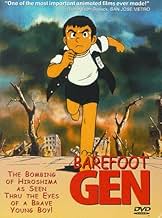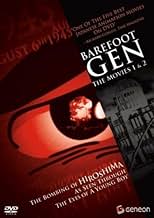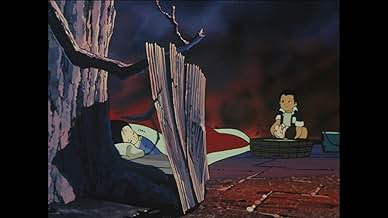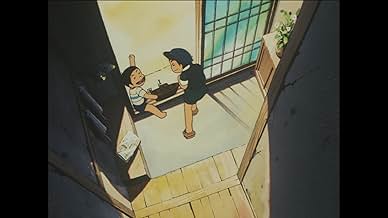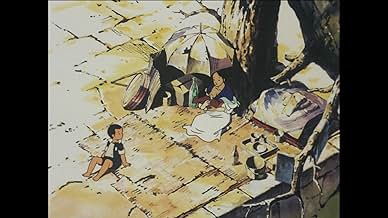CALIFICACIÓN DE IMDb
8.0/10
9.6 k
TU CALIFICACIÓN
Relata la historia del efecto de la bomba atómica en la vida de un niño y en la vida del pueblo japonés.Relata la historia del efecto de la bomba atómica en la vida de un niño y en la vida del pueblo japonés.Relata la historia del efecto de la bomba atómica en la vida de un niño y en la vida del pueblo japonés.
- Premios
- 1 premio ganado en total
Issei Miyazaki
- Gen
- (voz)
Catherine Battistone
- Gen (1995)
- (English version)
- (voz)
Iona Morris
- Kimie (1995)
- (English version)
- (voz)
Masaki Kôda
- Shinji
- (voz)
- …
Brianne Brozey
- Shinji (1995)
- (English version)
- (voz)
- (as Brianne Siddal)
Barbara Goodson
- Ryuta (1995)
- (English version)
- (voz)
Takao Inoue
- Daikichi
- (voz)
Kirk Thornton
- Daikichi (1995)
- (English version)
- (voz)
- (as Kurk Thornton)
Seiko Nakano
- Eiko
- (voz)
Wendee Lee
- Eiko (1995)
- (English version)
- (voz)
Takeshi Aono
- Eizo
- (voz)
Michael McConnohie
- Eizo
- (English version)
- (voz)
- (as Amike McConnohie)
- …
Katsuji Mori
- Seiji
- (voz)
Taeko Nakanishi
- Hana
- (voz)
Junji Nishimura
- Pak
- (voz)
Ardwight Chamberlain
- Pak
- (English version)
- (voz)
- …
Argumento
¿Sabías que…?
- TriviaThe author of the "Barefoot Gen" manga, Keiji Nakazawa, said that 70% of the story is based on true events from his experience of the atomic bombing of Hiroshima.
- ErroresWhen Gen and Shinji take a big bite from a sweet potato from each end, they are then told by Eiko to give the sweet potato to their mother. Once the sweet potato is given to her, it is whole again.
- Citas
Daikichi Nakaoka: This war can't be right. But it's only the cowards like me who dare say it. If there were only a few more like us. You know, sometimes it takes more courage not to fight than to fight, to not want to kill when all around you are calling out for blood. That's real courage in my book. If you boys remember nothing else I teach you, I hope you'll remember that.
- Créditos curiososThe closing credits run horizontally from the left side. Above the credits is footage of a paper boat lantern built sailing past multiple lanterns. After the boat has slowly vanished, the lanterns slowly turn into stars.
- ConexionesFeatured in Hadashi no Gen 2 (1986)
Opinión destacada
The story is excellent, the animation effective, but the lack of in-between frames is intrusive in spots. For the full story, read the graphic novels. They provide an even more effective tale.
As with Nosaka's "Grave of the Fireflies," Gen deals with a Japanese youth in the waning days of WW II. The first 30 minutes shows him to be typical for his stage of life, swinging between a self-centered boy and an adult. He is suddenly thrust into the position of head of the family after the Hiroshima bomb kills his father, brother, and sister, and destroys the city. The remainder of the movie deals with his transformation into an adult, with adult sensibilities and adult responsibilities.
Gen is clearly a Japanese story - the author, Nakazawa, lived through the event as a child. But the story could have taken place in Dresden or London just as easily. Although the atomic bomb is the event the movie revolves around, the story is really about the people - the children - and the effect the event has on their lives.
It's too bad that so much of the books had to be sacrificed to the time limits of a film. The novels delve much more deeply into the cruel society that Japan was in the 1940s. For example, much more was made of the neighbor's Korean background in the book; in the movie, you wouldn't realize the ethnicity if you didn't think about the name.
As a conventional film, Gen would probably be too honest to find real appeal in the U.S. Worse, the animation format will probably dissuade those who would otherwise see and appreciate it. Like most Japanese anime, this is not a "cartoon." It is a serious film in an unconventional - for the U.S. - medium.
The DVD transfer is excellent and belongs in your collection. This is a movie that continues to educate and enlighten with each viewing.
As with Nosaka's "Grave of the Fireflies," Gen deals with a Japanese youth in the waning days of WW II. The first 30 minutes shows him to be typical for his stage of life, swinging between a self-centered boy and an adult. He is suddenly thrust into the position of head of the family after the Hiroshima bomb kills his father, brother, and sister, and destroys the city. The remainder of the movie deals with his transformation into an adult, with adult sensibilities and adult responsibilities.
Gen is clearly a Japanese story - the author, Nakazawa, lived through the event as a child. But the story could have taken place in Dresden or London just as easily. Although the atomic bomb is the event the movie revolves around, the story is really about the people - the children - and the effect the event has on their lives.
It's too bad that so much of the books had to be sacrificed to the time limits of a film. The novels delve much more deeply into the cruel society that Japan was in the 1940s. For example, much more was made of the neighbor's Korean background in the book; in the movie, you wouldn't realize the ethnicity if you didn't think about the name.
As a conventional film, Gen would probably be too honest to find real appeal in the U.S. Worse, the animation format will probably dissuade those who would otherwise see and appreciate it. Like most Japanese anime, this is not a "cartoon." It is a serious film in an unconventional - for the U.S. - medium.
The DVD transfer is excellent and belongs in your collection. This is a movie that continues to educate and enlighten with each viewing.
- cpto
- 27 abr 1999
- Enlace permanente
Selecciones populares
Inicia sesión para calificar y agrega a la lista de videos para obtener recomendaciones personalizadas
- How long is Barefoot Gen?Con tecnología de Alexa
Detalles
Contribuir a esta página
Sugiere una edición o agrega el contenido que falta

Principales brechas de datos
What is the streaming release date of Gen de los pies descalzos (1983) in Brazil?
Responda
